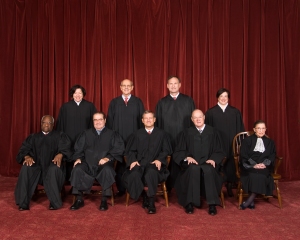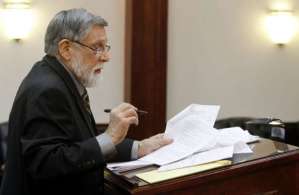By John Cheeves – jcheeves@herald-leader.com
Read more: http://www.kentucky.com/2011/10/28/1938427/court-upholds-kentucky-law-requiring.html#ixzz1c6cQzF82
The Kentucky Office of Homeland Security has the right to publicly declare “dependence on Almighty God as being vital to the security of the Commonwealth,” the state Court of Appeals ruled Friday.
State law requires the Office of Homeland Security to publicize God’s benevolent protective powers in its official reports and on a plaque posted outside the entrance to the state Emergency Operations Center in Frankfort. State Rep. Tom Riner, D-Louisville, a Southern Baptist minister, placed the “Almighty God” language into a 2006 homeland security bill without much notice at the time.
A group of atheists sued after the Lexington Herald-Leader wrote about the law in 2008. They argued that the U.S. and Kentucky constitutions prohibit the government from endorsing religion or conveying messages of mandatory religious belief. In 2009, Franklin Circuit Judge Thomas Wingate sided with them and struck down the law.
But in a split decision, a three-judge appellate panel ruled Friday that the state law is constitutionally harmless.
The appellate judges compared Kentucky’s law to Ohio making “With God, All Things Are Possible” its official state motto, which the U.S. 6th Circuit Court of Appeals upheld as constitutional in 2001, they wrote.
“The Kentucky legislature has not attempted to compel belief or participation in any form of religious exercise, nor does it seek to prefer one belief over another. A simple reference to a generic ‘God’ acknowledges religion in a general way,” wrote Judge Laurance VanMeter of Lexington in the majority opinion. VanMeter was joined by Judge Thomas Wine of Louisville.
In a dissenting opinion, Special Judge Ann O’Malley Shake of Louisville said Kentucky’s law crossed a constitutional line. Among other things, she noted the law has criminal penalties, including up to 12 months in jail, for anyone who fails to comply.
Unlike the Ohio state motto, which is “passive,” Shake wrote, Kentucky’s law “is a legislative finding, avowed as factual, that the commonwealth is not safe absent reliance on Almighty God. Further, (the law) places a duty upon the executive director to publicize the assertion while stressing to the public that dependence upon Almighty God is vital, or necessary, in assuring the safety of the commonwealth.”
One of the plaintiffs, American Atheists, plans to appeal Friday’s decision to the Kentucky Supreme Court, said its president, David Silverman. American Atheists is a national non-profit advocacy group.
The fact that two Kentucky judges have said the law is constitutional and two other judges have disagreed “just shows the very deep division over religion in our society,” said Edwin Kagin of Union, an attorney for American Atheists.
“What if the law required that Kentucky acknowledge our reliance on the benevolent protection of Allah? Would everyone still be in favor of it then?” Kagin said. “Of course not.”



